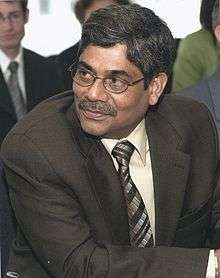Subramaniam V. Iyer
Subramaniam Vishwanathan Iyer, (S. "Vijay" Iyer, born 25 December 1957), is currently the Managing Director of Rio Tinto India,[1] and the former Director of Energy and Sustainable Development at the World Bank Group[2]
Iyer holds an MS in Chemistry from Jabalpur University and a Masters in Management and Public Policy from the Yale School of Management. He currently resides in New Delhi, is married to Vijayalakshmi Iyer, and has two sons, Hari and Sri Iyer
| Subramaniam Vishwanathan Iyer | |
|---|---|
 | |
| Managing Director, Rio Tinto India | |
| Former Director of Energy and Sustainable Development, World Bank Group | |
| Personal details | |
| Born |
25 December 1957 Jabalpur, India |
| Alma mater |
Jabalpur University Yale School of Management |
Career
District Collector Indore
Prior to joining the World Bank, Iyer served as District collector through the Indian Administrative Service in the city of Indore in Madhya Pradesh, India. During his term as Collector, Iyer worked to enhance government transparency, eliminate corruption in the police force, and restore historic sites in the greater Indore area.
World Bank Group
Sustainable Energy for All
Iyer's primary focus while as Energy Director of the World Bank Group was increasing access to clean energy for the poor through collaboration between the public and private sectors,[3] primarily in Sub-Saharan Africa. Notable projects include the Bangladesh Solar Initiative, which provided solar power to over 2 million rural homes which were previously without electricity and lighting.[4] Additionally, Iyer worked to increase electrification for hundreds of thousand of rural poor in Senegal, Ethiopia, and Tanzania through the implementation of biomass energy projects[5]
Criticism
Despite the Bank's efforts to increase electrification, Iyer drew criticism from environmental policy advocates for maintaining that fossil fuels are a viable option to increase electrification for Africa's poor.[6] In response, Iyer maintained that renewable options were cost prohibitive for many regions in Africa that had no access to energy, and that in order for these cost barriers to be removed, the economic growth that results from initial electrification must first be realized.
References
- ↑ "S. Vijay Iyer". Retrieved 3 October 2015.
- ↑ "S. Vijay Iyer". Retrieved 3 October 2015.
- ↑ "Country-based Action to Achieve Universal Access to Energy". Retrieved 3 October 2015.
- ↑ "Bangladesh: Lighting Up Rural Communities". Retrieved 4 October 2015.
- ↑ "Biomass: Meeting Sub Saharan Africa's Energy Needs". Retrieved 3 October 2015.
- ↑ "World Bank Energy Lending Still Veering in Wrong Direction". Retrieved 3 October 2015.